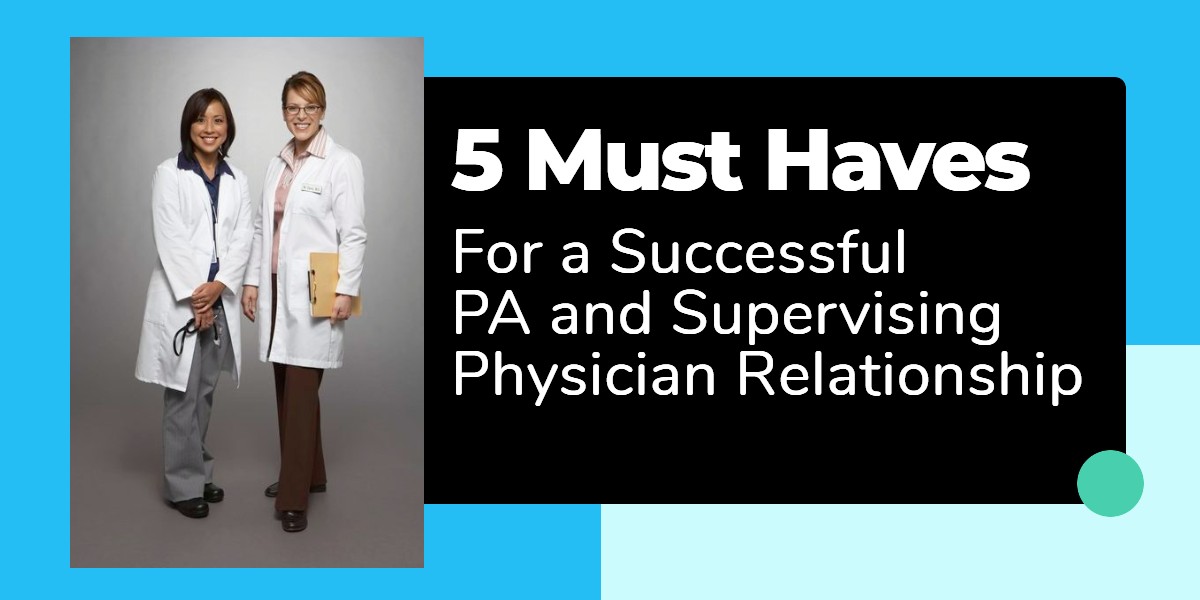Over my 15 years + as a PA I have had been lucky to work with some incredible physicians.
Physicians who get what I do, treat me like a colleague and understand my utility (both to my patients and to the practice).
The best working relationships are the same as those that make a great marriage: They include a large dose of mutual respect, patience, presence, and appreciation.
Here are 5 Must-Haves for a Successful PA and Supervising Physician Relationship
1. A Willing Mentor and a Willing Apprentice
I place this as number one because I think it really is the most important, especially if you are a new PA.
Feeling comfortable with your supervisor has the potential to save lives. The majority of medical errors I see PAs make (rare as they may be) are usually a result of making decisions that you aren’t comfortable with. Having a good working relationship with your supervisor, one that is open to ALL questions will give you the security you need to do your job well.
Now that I have been practicing for several years it is not uncommon to find myself in a position to help many of our new doctors. I always am impressed when the doctors are willing to hear my thoughts as well. It is a two-way street.
2. A Mutual Understanding of What You Can and Cannot do
It is a good idea to sit down together and discuss your strength's and weaknesses. Don’t be afraid, to be honest.
Yes, you may be embarrassed that you just accepted this new family practice job and you have never really done a pelvic exam on a “real” patient (my situation). But that is OK.
If you are honest about these things and you don’t try to act as you know it all you will learn how to do things right. It may take a few attempts and again that is ok. But if your supervisor understands where you are coming from this will make all the difference
3. Patience...Lots of it
This was a hard one for me. It is inevitable that some of your most complicated patients will arrive on your busiest days. Your rooms are full, you are an hour behind and you just want an answer: STAT – minus the teaching moment. But the best teachers are also the ones who understand the value of a teaching moment. Waiting to get an answer to your question may be the number one deterrent to asking a question. But I will encourage you to dig deep and have patience. I can remember these moments (and there were lots of them) but it was always worth it. I learned something that I now probably use every day.
4. Availability
When started my first job I was required to work Saturday clinics. This wouldn’t have been bad except for the fact that I was alone. As a new physician assistant, this is a tough situation and one that can be anxiety provoking. The only thing that made this tolerable was knowing that somebody had my back. Unfortunately, this was not always the case. Make sure that you work this out with your supervisor and if you are new it is important that they are not just “available” by phone but that they are actually available when you need them most. Nothing is worse than that dial tone when you really need a helping hand.
5. Honest (and supportive) Feedback
The best supervisors can give good constructive criticism but also know how and when to give you a pat on the back from time to time. I love critical analysis of my work, it makes me a better physician assistant. But when that is all you get it can become demoralizing. On the opposite side of that coin is the supervisor who thinks everything you do is pitch perfect. In this case, you may feel good but there will be no growth in your work.
Having a supervising physician that is present, kindly critical and has a desire to see the best for your patients is a perfect world!
What if you are not getting what you need?
This is a good question and needs to be addressed. If you are working in a toxic environment you need to let someone know. If this toxic environment is your employer then it may be time to start looking for a new job. There is no shame in this you have worked hard to earn your degree, you are smart and capable don’t let a bad working environment shape your (or your patient's) future.
















Leave a Reply